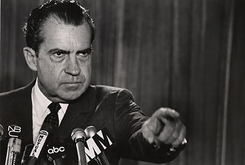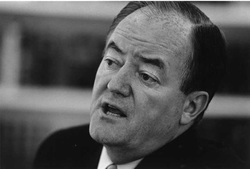
At the heart of Nixonism was a blend of idealism and realism. That was reflected in his foreign policy. He wanted world peace, but Nixon thought he had to use maximum force in Vietnam to achieve it. Most of all, he always hoped to build a conservative public service ethos that would appeal to the young (see this hopeful 1968 ad). Ironically, his involvement in the break in at the Watergate Hotel (site of the 1972 Democratic Party’s headquarters) destroyed his reputation and forever damaged public confidence in government. It might seem obvious, but that's really not how Tricky Dick would have wanted it.
The narrative of the Watergate scandal needs challenging, if only to respect the memory of man who deserves to be remembered for more than just corruption. And the narrative does have holes. Orthodoxy says that after he narrowly won election in 1968, Richard Nixon decided to use all the power of the imperial presidency to smash his liberal opponents and win re-election in 1972. He used police state tactics to destroy the antiwar movement, covered the White House in bugs, employed dirty tricks to undermine his Democratic opponent and burgled the psychiatrist of Daniel Ellsberg to dig up dirt on the man who leaked papers that displayed the full mendacity of the Vietnam War project. In June 1972, Nixon ordered a break in at the Watergate Hotel that was presumably a fishing expedition to see what the Democrats had by way of intel. The thieves were caught and the administration’s crimes were investigated by a Senate committee chaired by Sam Ervin. It found evidence of a conspiracy to pervert the course of justice. Rather than face impeachment, Nixon resigned the presidency and took his incriminating Watergate tapes with him.
In a major feature in the Independent last week, Woodward and Bernstein – the Washington Post reporters credited with breaking this story - increased the list of Nixon’s crimes to include racism, silencing the free press, subverting democracy and rewriting history. The irony is that in trying to prove that they brought down an evil genius, Woodward and Bernstein make Nixon sound far more competent and Machiavellian than he really was. It begs the question, if Dicky was this tricky, how did he get undone by a “third-rate burglary?”
Based on what we do know (and, crucially, we lack a lot of evidence for Woodward and Bernstein’s allegations – be they true or false) here are a few corrections to this narrative.
1. The bugging system wasn’t as bizarre as it sounds. Nixon got the idea of taping what went on in the White House from Lyndon Johnson. The idea wasn’t to spy on his staff (although it had that effect) but to provide an accurate historical record of what went on during Nixon’s time in office. Historians are secretly glad he did it, because they leave a remarkably unedited and honest account of White House life.
2. Nixon’s dirty tricks were nothing unusual. Consider that in 1960 the Democrats almost certainly cooked up enough votes in Illinois and Texas to steal that year’s Presidential election. Nixon’s staff saw dirty tricks as a natural part of the “game” of politics, and when they made a fearsome defence of them before the Ervin committee the issue was dropped.
3. We can’t prove that Nixon had anything to do with the Ellsberg burglary. What we do know is that he actually stood to profit from the publication of Ellsberg’s papers, because they exposed the inept decision making of the Kennedy and Johnson administrations.
4. Nixon did wage a war against the antiwar movement, and that was probably no bad thing. The country was close to civil war and the antiwar folks were turning violent: From September 1969 to May 1970, there was at least one bomb threat in America every day. On May 9, 100,000 demonstrators occupied Washington DC. They slashed tires and started fires; nearly 12,000 were arrested in the largest mass arrest in US history. But what brought this anarchy to an end wasn’t the intense surveillance campaign that Nixon authorised, it was his decision to end the draft. As the rate of body bags returning to the US from Vietnam dropped, interest in the antiwar movement petered out. It was basically a spent force by 1972.
5. We have no evidence that Nixon ordered the Watergate burglary or knew anything about it. It is true that we have a recording of him asking an aide to tell the CIA to advise the FBI to drop its investigation. This is the so-called “smoking gun” tape, and it certainly suggests that Nixon tried to pervert the course of justice. The CIA and the FBI declined to accept this request (indeed one of Nixon’s problems was that justice officials would consistently ignore his demands). Nixon did not pursue the idea any further. Nonetheless, this is the one crime on which we can definitely nail him, and it’s the crime over which he was urged to resign by his own staff.
6. Nixon was terrible at covering things up. If Nixon was truly the grand conspirator that Woodward and Bernstein portray him to be, he wouldn’t have made so many mistakes. He failed to destroy the tapes, he (albeit reluctantly) allowed transcripts to be printed that showed him in all his verbal ugliness, he relied too heavily on the loyalty of Senate friends and he failed to use the military or CIA to defend himself in the way that his more paranoid opponents feared. What he did try to do was continue to be a good President. In the midst of the Watergate crisis, he helped prevent World War III starting in the Middle East.
7. The Watergate hearings were a very partisan affair. Historically, that’s always been the case with impeachment processes (consider how Bill Clinton was hounded by the Republican Congress). In this instance, the partisanship started when Democrats on the Judiciary Committee decided to expand the grounds of impeachment from something related to criminal charges to what they dubbed “a constitutional safety valve” – essentially a wide-ranging Congressional judgment on the ethics of an incumbent president. Hence, the committee decided to investigate the conduct of foreign policy as well as internal security. It is true that, over time, partisanship broke down as the administration’s crimes became obvious. But be in no doubt: for some in Congress this was a chance to bring down a Republican who they never liked.
Finally, just how non-partisan were Woodward and Bernstein? The Washington Post was effectively a Democrat newspaper; it was published by Katharine Graham, who was an avid New Deal Democrat and friend to both the Kennedys and Lyndon Johnson. Aside from the liberalism of much of the Post staff, Russ Baker, author of Family Secrets, claims that Woodward himself was an Agency man. Baker’s story reads like a lot of conspiracy minded foolishness. But he has a fair beef with Woodward that, far from being an anti-establishment liberal, the journalist has used his credentials and access to write books that tend to be sympathetic towards the Agency or the US military complex. He’s not quite the idealist his Watergate endeavours suggest.
One way of seeing Watergate is an alignment of anti-Nixon forces in politics and the press that conspired to oust a man who had proven unreliable. Or, even worse, rather too good at his job. Although Nixon’s crimes were real, his greatest crime in the eyes of many of his opponents was that he had brought peace to Vietnam, went to China, stolen power from the FBI and CIA, broken the antiwar Left and won re-election. Thanks to Watergate, however, he’ll be forever known for that third-rate burglary. That’s not fair.

 RSS Feed
RSS Feed